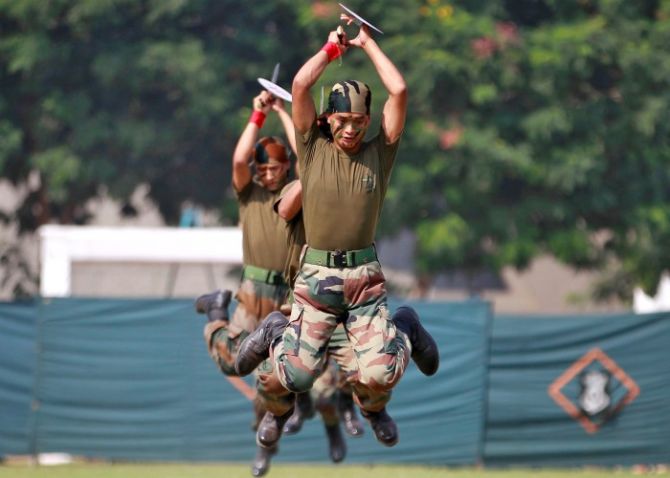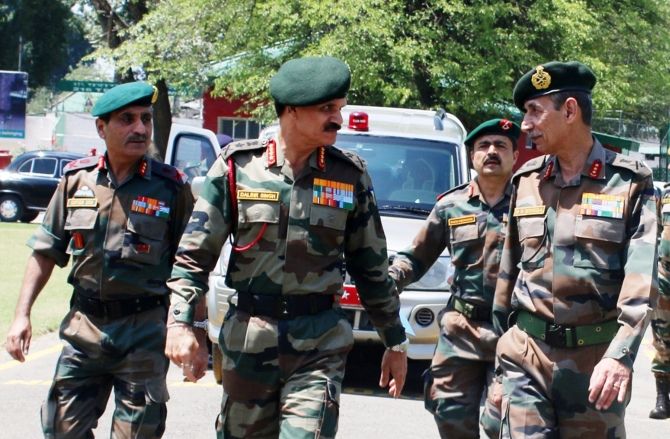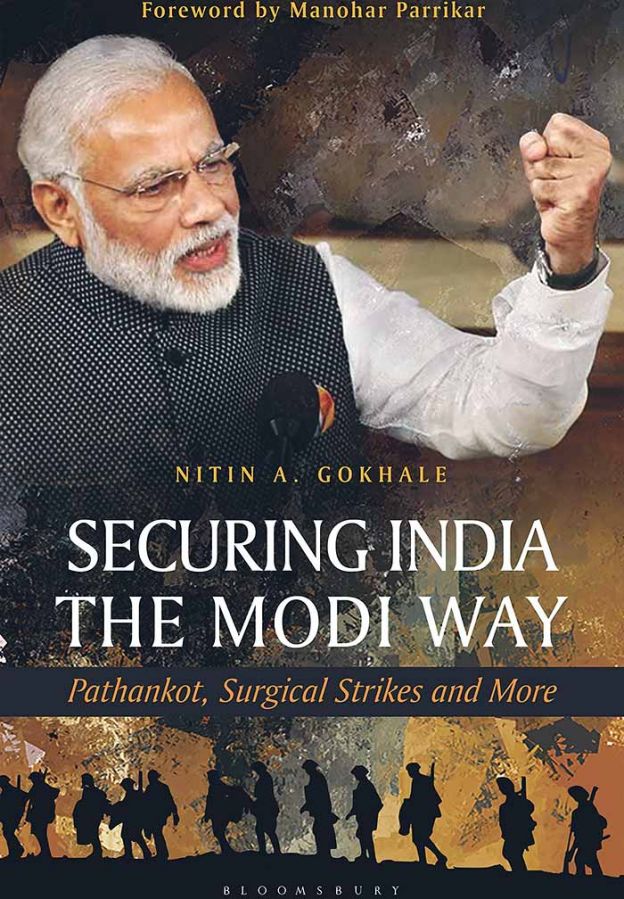'Not a single soldier should be left behind in enemy territory.'
Nitin A Gokhale's fascinating account on how the Indian Army conducted the daring and successful cross-border operation in September 2016.
An exclusive excerpt from Nitin's engaging book, Securing India the Modi Way: Pathankot, Surgical Strikes and More.

For Col H and Col K (names withheld), the moment of reckoning arrived on the afternoon of 18 September 2016.
Throughout that morning, the Commanding Officers (COs) of two separate Para (Special Forces) battalions were like most of their colleagues posted in the Kashmir Valley, following the increasingly grim news coming out of Uri, the garrison town not very far from Srinagar.
Well-trained and well-informed terrorists of the Lashkar-e-Toiba (LeT) had infiltrated across the Line of Control (LoC) and attacked an administrative camp in the 12 Brigade HQ located in Uri with deadly effect.
At least 19 soldiers of 6 Bihar battalion, camping in tents -- days before they were to take their assigned positions along the LoC -- were killed in the early morning attack.
Majority of the soldiers died in their sleep, resting as they were in highly inflammable tents.
Although all the four terrorists were neutralised eventually, they had set off a chain of events that would culminate on the morning of 29 September.
In Udhampur, Northern Army Commander Lt Gen D S Hooda was distressed.
He had been the GOC-in-C for over two years and witnessed his share of successes and setbacks as the head of India's most active Army command.
Nevertheless, this was possibly the worst moment of his long and distinguished career, spent fighting insurgencies and terrorism in the north-east as well as Jammu & Kashmir.
"It was terrible. Very difficult to justify what happened. There were definitely lapses on our part," Hooda says in retrospect.
But an Army Commander doesn't have the luxury of wallowing in his own state of mind. He has to set an example by leading from the front.
As he accompanied Army Chief Gen Dalbir Singh to Uri, Hooda knew the time had come to implement a plan, the seeds of which had vaguely taken shape in his mind some fifteen months ago.
Even Gen Dalbir, aware of how the Prime Minister's mind worked, was thinking of something different.
Gen Dalbir was drawing on his experience during the cross-border raid in Myanmar more than a year previously when the PM had quietly authorised the strike against north-east militants holed up in the jungles of the Manipur-Myanmar border after killing 18 Indian soldiers.
Gen Dalbir had a hunch then that the Prime Minister may demand a Myanmar-like action if push came to shove in J&K.
Cut to mid-June in 2015. In June 2015, it was under his watch as Army Chief that the soldiers of a Para SF unit of the Indian Army, based in the north-east, had carried out a precise attack on an NSCN (K) camp located inside Myanmar and eliminated at least 60 insurgents in the process.
While the cross-border raid inside Myanmar was making waves and dividing opinion, discussions in TV studios in India centred around the possibility of similar raids against Pakistan.
Minister of State of Information & Broadcasting, Rajyavardhan Rathore told TV anchors that the option of cross-border raids against Pakistan are a possibility.
He also told the Indian Express in June 2015: 'This is a message for all countries, including Pakistan, and groups harbouring terror intent towards India. A terrorist is a terrorist and has no other identity. We will strike when we want to.'
The success of the Myanmar operations had planted the seed of thought about a surgical strike in Pakistan in everyone's mind.
Once during his visit to the Northern Command, then defence minister Manohar Parrikar too had exhorted top commanders to be prepared for every eventuality.
"Although I didn't spell it out explicitly, I knew some day a grave provocation by Pakistan may require a Myanmar-like operation. So I told the Army Chief and his senior commanders to look at every possible response," Parrikar recalls.

On his part, Lt Gen Hooda called the two COs (Col H and Col K) and told them that they needed to start looking at targets across the LoC, although frankly at that point in time (June 2015) neither Gen Dalbir, nor Lt Gen Hooda or the political leadership would have thought of such an eventuality arising.
Till then, the thinking at the highest levels of India's political and military leadership was any major trans-LoC strike would be deemed escalatory.
Remember, in Kargil, the Vajpayee government had imposed the strict restriction of NOT crossing the LoC in spite of a grave provocation.
"I thought to myself, if tomorrow someone asks us to go, how can I, as Northern Army Commander say we are not prepared?" Hooda remembers thinking.
Gen Dalbir says: "From my experience in planning and executing the Myanmar raids, I wanted my commanders to make sure that any cross-border raid should be carried out with minimum casualties. My instructions were, not one single soldier should be left behind in enemy territory even if we suffered any setback."
Hence, in the immediate aftermath of the Myanmar operation, the two COs were told to seriously plan to hit targets inside PoK.
Other senior officers in Northern Command's planning staff also held discussions a couple of times with the MO (Military Operations Directorate at the Army HQ).
They identified targets, looking for more intelligence inputs on them, and consolidating a thought process in the presence of the Army Chief and the Northern Army Commander.
But were not cross-border raids carried out earlier too, I asked Gen Dalbir.
"Yes, they were," he agreed, "but most actions taken in our younger days were, what we call, BAT (Border Action Team) raids on specific post(s) as retribution for something that the Pakistan army troops would have carried out on our position(s)," he said.
"What we were now planning for was much larger with greater ramifications," he explained.
For two months in the winter of 2015, the two battalions trained as whole units after years of operating in small, agile teams against terrorists in J&K.
This training was to prove crucial in sharpening the set of skills needed for raids across the LoC.
In a way, it was like revisiting their basic tenets for the Special Forces men. And they loved it.
Although no one could have anticipated that they would be called in to strike across the LoC, the very thought of crossing a line that was seen as taboo motivated the troops further.
Indeed for over two decades no one at the highest political level had ever expressed willingness to sanction, or had demanded such an action inside PoK for the fear of escalation.
"The two to two-and-a-half months that these boys spent together helped them hone their skills in surveying targets, mount surveillance, practising infiltration and exfiltration, which in the final analysis helped them achieve what was asked of them," a senior officer in the MO Directorate, privy to the development, now agrees, looking back at that decision.
As a result of the reorientation, by the time the summer of 2016 arrived, the two battalions had added an extra edge to their repertory of formidable skills.
However, no one -- not even the most imaginative scriptwriter in Bollywood -- could have anticipated the events as they unfolded in September 2016.

Across the board, the langar gup (mess gossip) was full of frustration and rage.
I remember speaking to some middle level officers posted in J&K in the immediate aftermath of the Uri incident. The anger was palpable.
"If this is not the last straw, what is?" many of them wondered aloud when the possibility of the Indian Army's retaliation was discussed.
NSA (National Security Adviser) Ajit Doval too remembers Prime Minister Modi telling him: 'This attack should not go without a response.'
Gen Dalbir adds: "During one of the meetings in the immediate aftermath of Uri, the Prime Minister said the retaliation should be immediate to send an unambiguous message."
Parrikar, Doval and Gen Dalbir, however, knew they had to plan for several contingencies before attempting a Myanmar-style cross-border raid.
For one, unlike on the Myanmar border, the Pakistani forces strung all along the LoC were on highest alert in the wake of the Uri attack.
The terrorists would have also been told to lie low and shifted to camps located farther away from the LoC so that hitting those targets would have become harder.
Moreover, no matter how remote the possibility, India had to wargame the likely escalation by Pakistan if retribution was ordered.
Excerpted from Securing India the Modi Way: Pathankot, Surgical Strikes and More by Nitin A Gokhale, Bloomsbury Publishing India. Excerpted with the author's kind permission.










